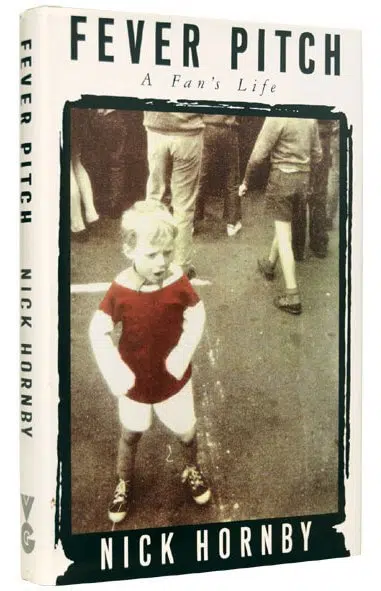
Nick Hornby’s Fever Pitch did not invent anything: the entire vocabulary and set of behaviour patterns it relates were already well-known. But it introduced a different way of talking about the football addiction, a new narrative.
Fever Pitch is the monument to the ‘unknown supporter’. Many football lovers, of whatever level of education, recognised themselves in the bittersweet nostalgia of this both hilarious and sad account of what it means to be diagnosed football-virus-positive. There it was, all laid out before them in a funny, touching story: this helpless feeling of being emotionally imprisoned in the attachment to a football club, the stupid urge to keep on suffering weekend after weekend on windy and drenched terraces, the self-mocking despair about this stupid game’s totally disproportional impact on your daily life.
Hornby brought supporters comfort and relief, by activating and reformulating something they had never really lacked, but had been mostly unaware of: ironic distance.
Irony is based on a deep, shared understanding of an object, dissimulated behind apparent ignorance. It is an implicit agreement with one’s audience about the inadequacy of what is explicitly said. But irony is not cheap mockery of something that deserves contempt: it only works if the object of its derision is taken seriously in the first place.
Football is a case in point. Football-bashing is boring. But football irony can be truly funny. Football’s most-quoted definition – Bill Shankly’s ultimate sentence about it being much more than just a matter of life and death – is a wonderful illustration. The effect of humour in this ironic statement is mainly drawn from the fact that behind the obvious absurdity of the claim, there is a shared understanding that – ‘well, I hate to admit it, but let’s face it’ – it holds a kernel of truth. The life of a football lover is rife with moments that can, for fear of utter ridicule, only be openly referred to behind a veil of irony.
In a large social group, irony can only function if there is a shared (aesthetic) experience to which it can refer. This post, being published on a blog that is dedicated to football in China, therefore almost automatically raises the question to what extent it is possible to create, as intended by President Xi Jinping, a football nation from scratch, without the decades of accumulated understanding of the game and what it does to people.
In 1994, only two years after the release of Fever Pitch, Chinese football went professional. And as in so many other fields, China is taking the shortcut and jumping directly into postmodernity. Football has never been the country’s ‘national sport’, there seems to be no widely shared tradition of supportership, it does not seem to have played any role in processes of self-perception or identity formation.
Today, the government expresses the political will and mobilises the economic means to implement the immensely ambitious reform programmes and achieve, in record time, what must well be termed a ‘football revolution’ across the nation. Looking at China’s track record of performance over the last quarter century, there is hardly any doubt the market will continue to explode and, at one point, the massive effort in detection and training of talent will bear fruit.

In other words: Where is China’s Nick Hornby? A simple question that entails that academic research about the contemporary Chinese football revolution should be accompanied by studies in literature and, ideally, some ethnographic field work among Chinese football fans. What does their collective memory look like? How strong can the roots of fandom be without a whole century punctuated by the reassuring rhythm of successive seasons and a shared canon of unforgettable highlights?
It’s not complicated to be a customer of today’s football industry. But as an individual socialised in Europe, I doubt I would be have any interest for it if I did not have that bittersweet Fever Pitch nostalgia for a time that is no more, will not come back, but generated a touching, sometimes ironic, lasting narrative.
Initially published on Chinafootball8 .




